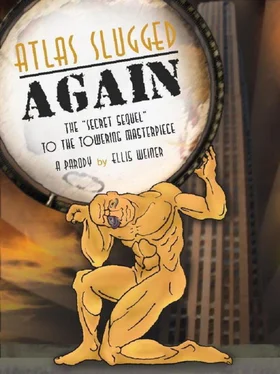Ellis Weiner - Atlas Slugged AGAIN - The Secret Sequel to the Towering Masterpiece
Здесь есть возможность читать онлайн «Ellis Weiner - Atlas Slugged AGAIN - The Secret Sequel to the Towering Masterpiece» весь текст электронной книги совершенно бесплатно (целиком полную версию без сокращений). В некоторых случаях можно слушать аудио, скачать через торрент в формате fb2 и присутствует краткое содержание. Год выпуска: 2015, Жанр: humor_satire, на английском языке. Описание произведения, (предисловие) а так же отзывы посетителей доступны на портале библиотеки ЛибКат.
- Название:Atlas Slugged AGAIN: The Secret Sequel to the Towering Masterpiece
- Автор:
- Жанр:
- Год:2015
- ISBN:нет данных
- Рейтинг книги:3 / 5. Голосов: 1
-
Избранное:Добавить в избранное
- Отзывы:
-
Ваша оценка:
- 60
- 1
- 2
- 3
- 4
- 5
Atlas Slugged AGAIN: The Secret Sequel to the Towering Masterpiece: краткое содержание, описание и аннотация
Предлагаем к чтению аннотацию, описание, краткое содержание или предисловие (зависит от того, что написал сам автор книги «Atlas Slugged AGAIN: The Secret Sequel to the Towering Masterpiece»). Если вы не нашли необходимую информацию о книге — напишите в комментариях, мы постараемся отыскать её.
Atlas Slugged AGAIN: The Secret Sequel to the Towering Masterpiece — читать онлайн бесплатно полную книгу (весь текст) целиком
Ниже представлен текст книги, разбитый по страницам. Система сохранения места последней прочитанной страницы, позволяет с удобством читать онлайн бесплатно книгу «Atlas Slugged AGAIN: The Secret Sequel to the Towering Masterpiece», без необходимости каждый раз заново искать на чём Вы остановились. Поставьте закладку, и сможете в любой момент перейти на страницу, на которой закончили чтение.
Интервал:
Закладка:
The conference, which was to be held under conditions of absolute secrecy, began with an exchange of banalities, preliminary small-talk, and a shared sardonic admission that the clandestine nature of the event gave ample proof that its participants were moral weaklings and deserved the contempt of good, clean, rational men everywhere. Then the agenda was called. Mr. Jenkins began. “Everyone has been briefed, so you know our major concern. It’s this damn Strike. I don’t like it, I tell you! I don’t like it at all!”
“If I may, Monsieur Jenkins,” said M. Beaucoup. “It is liked by none of us. Having deceptively and self-servingly foisted collectivization upon our people, we are now discovering that, without a fantasy of one day escaping to a free America full of tolerance and opportunity, they have begun to believe that they should overthrow the People’s State and institute actual Capitalism! Sacre bleu, as we French say!”
“Quite so,” said Sir Lord Blimey. “It’s the same with us Brits in Britain. As career government workers, we found it in our narrow interest to expand the public sector as much as possible, resulting in a People’s State of the People which, as some wags have commented in their witty and ironic British manner, should more properly be called the People’s State of the Bureaucrats. We are happy to endure their sarcasm, and consider it a small price to pay for our large salaries, guaranteed job security, lavish expense accounts, and handsome pensions. In addition, we enjoy the kind of prestige among our fellow human beings that would be unknown to us were we to somehow find employment commensurate with our abilities in the private sector. But now that the U.S. has removed itself from the imagination of our people, there is widespread discontent and talk of re-instituting private enterprise! It is appalling, simply appalling.”
“Is John Glatt,” sneered Ivan Lubyanka. “He is crafty adversary. And wife. Also Mr. Hunk Rawbone and the Chilean talc merchant, De Soto. And Swedish pirate. Why you do not lock them up and throw away key?”
“Don’t blame me!” Mr. Jenkins cried. “I’m just the Head Person! I can’t help it! I have to do what I’m told. Moreover, I’m a weakling! I can’t assert even my own modest powers! I lack the inner strength that comes from consciously having integrity!”
“Be peaceful, my friend,” said Signor Tortellini. “We all want the same thing, in truth.”
“And what is that, gentlemen?” All conversation ceased as Professor Davis slowly removed the pipe from his mouth, puffed on it, filled it, and surveyed the men at whom he was looking. He was a repulsive fat slob with a shiny suit and a stain on his tie, the pattern of which was no longer in fashion. “Shall I tell you what it is that we all want? It is stability, security, and respect.”
“In our societies, do you mean?” asked M. Bonjour. “But of course.”
“Don’t cause me to laugh. I mean in our jobs. We want to protect our careers. Mr. Jenkins here, and the rest of us, are mere figureheads. The actual decisions in the U.S. have, for the last ten years, been made by John Glatt and those around him. This is so, not only because the people demanded it, but because we ourselves demanded it. We had no choice but to beg Glatt to rescue us with his community of businessmen, and to accede to his demands. We eliminated taxes. We amended what was left of our Constitution to protect production and trade. We removed all restrictions on manufacturing and scuttled all product safety requirements and food and drug purity laws. We did it in the name of freedom.”
“One is aware of this,” Signore Tortellini said coolly. “What now?”
“What now? I will tell you, my friend. This Strike has shown the American people that they can feel proud and alive, that they can love existence, just as much when government provides no social services, as when it provides many. They are discovering that such things as poverty, anxiety, fear, starvation, misery, and despair, endured in the context of physical squalor and societal turmoil, are nothing compared to the exhilaration experienced in the presence of true freedom. It is only a matter of time, then, until they conclude—with, no doubt, Glatt’s assistance—that they need no government at all.”
The room was silent, as if the individuals in it did not permit themselves to speak or possessed no will to do so.
“But see here, Professor old chap,” Sir Lord Blimey objected. “Surely one needs a government for national defense.”
“One does not, sir,” Professor Davis said, lighting his pipe and filling it and puffing on it wisely. “One needs only an army—or, as in our case, private security contractors.” The Professor rapped the ash from his pipe into an ash tray with a decisive series of taps. “No, gentlemen, the truth is this: all of us, if we are to retain our jobs, must stop John Glatt.”
“Is question how,” Ivan Lubyanka muttered.
“Just so,” said Dr. Francis Tinklepants. “But we’ve come up with a plan. At least—“ he added in his haste to avoid saying something definite, “I think it’s a plan, and I think we’ve come up with it. As an articulate spokesman who is essentially a coward, I could be wrong.”
“All right, Frank, all right,” Mr. Jenkins said, clearly uncomfortable with this meeting, and with existence. “Here’s the idea. You boys—“ He gestured toward the heads of the People’s States. “—declare war on us.”
There was an explosion of befuddlement, outrage, and indignation. M. Bonjour called the idea “extreme.” Sir Lord Blimey asked, “What will that accomplish, exactly?” Signore Tortellini dismissed the idea with “Bah. Ridiculo,” and a rude, typically Italian gesture. Ivan Lubyanka looked cautiously intrigued.
“Okay, settle down,” T.T. Mucklicker yelled. “Now just hold on to your horses. Think about it. You declare war on us. We announce a wartime footing and maybe introduce a bit of martial law. Then we proclaim Glatt and his pals as the cause of all this, and we take them into custody for questioning. We let them out in maybe a hundred years or maybe never. We bring back the laws that once made America synonymous with edible broccoli, you end the embargo, and everybody goes back to work. Especially us.”
There was a minute’s silence as all in the room contemplated the idea. Finally Ivan Lubyanka said, “Could work.”
“But on what basis will we declare war?” Sir Lord Blimey asked. “We’re already applying an embargo. If anything, it’s you who should declare war on us .”
“We thought of that,” Mr. Jenkins bleated. “But in order to rally the whole nation behind us, we need the country to feel like it’s being unfairly victimized. It works better if you attack us than if we attack you.”
“You realize, gentlemen,” Sr. Tortellini said. “That when you are talking about the rest of us, you are referring to the entire world—every nation on earth except your own. If there really were a state of war between you and all of us, we probably could defeat you.”
“Slim to none chance,” T.T. Mucklicker said. “You forget, Giuseppe—your people love us. They’re rising up against you because they miss us.”
“Look, everyone,” Mr. Jenkins yelled. “There isn’t going to be any real war. Nobody is going to mobilize their army or kill anyone. It’s all just to give us a pretext for seizing John Glatt and his friends. Agreed?”
Seven heads nodded silently as everyone said, “Agreed.”
Chapter 8
Anti-Maim
The Tagbord Special hurtled through the night, traversing farmland and undeveloped rural tracts, past cozy encampments of families clustered around blazing campfires, the men rising to their feet at the approach of the roaring train to lift an arm in hearty greeting, the women’s faces illuminated by the ruddy orange light of the fire and smiling softly as their children gazed in wide-eyed wonder and sucked on fresh carrots pulled from the living earth not five minutes earlier. Occasionally Dragnie would hear a muffled thud from the rear of the executive car, as an ambitious vagabond would attempt to clamber aboard the car’s entry steps but, finding his way blocked by her security men, would leap or be helped off a moment later. Over the four weeks they had been conducting this tour, Dragnie and Banden had become used to the sight of three or four stowaways who, having clung to the rear of the last car for hundreds of miles, ducking low to avoid detection and enduring weather ranging from northwest downpour to southwest desert heat, leaped off at the next station when the train stopped to take on water. They would then scramble away over the weed-choked sidings or through the dilapidated terminal building and into the town, in their endless quest for economic opportunity and the realization of their deepest values.
Читать дальшеИнтервал:
Закладка:
Похожие книги на «Atlas Slugged AGAIN: The Secret Sequel to the Towering Masterpiece»
Представляем Вашему вниманию похожие книги на «Atlas Slugged AGAIN: The Secret Sequel to the Towering Masterpiece» списком для выбора. Мы отобрали схожую по названию и смыслу литературу в надежде предоставить читателям больше вариантов отыскать новые, интересные, ещё непрочитанные произведения.
Обсуждение, отзывы о книге «Atlas Slugged AGAIN: The Secret Sequel to the Towering Masterpiece» и просто собственные мнения читателей. Оставьте ваши комментарии, напишите, что Вы думаете о произведении, его смысле или главных героях. Укажите что конкретно понравилось, а что нет, и почему Вы так считаете.












